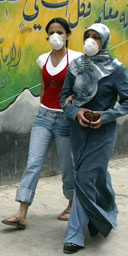War prompts Lebanese brain drain
Declan Walsh in Beirut | The Guardian | Tuesday August 29, 2006
 Brain drain: After the war, a new generation of Lebanese are packing their bags to leave. Photograph: Oussama Ayoub/AFP/Getty Image |
The line snaked past the Canadian embassy in Beirut on a sweltering afternoon. Sandra fanned herself with the visa application she prayed was her ticket out of Lebanon.
“I can’t live here any more,” said the 35-year-old university researcher, who gave only her first name. “I really wanted to stay. But this war was the final straw.”
The mood was equally black down the sweaty queue. Israel’s bombs not only smashed bridges and killed innocent people, most said, they also wrecked their plans for a life in Lebanon.
“As soon as the fighting started we decided to leave,” said Abdel Jhalil, a 25-year-old factory worker from Tripoli, further up the coast. “Things are not going to improve. It will always be like this.”
Shocked by the intensity of Israel’s 34-day offensive and dispirited about the prospects for peace, a new generation of young Lebanese are packing their bags to leave. Statistics on the exodus are unavailable but a weight of anecdotal evidence suggests it is sizeable and includes some of the country’s brightest and best-educated minds.
Charli Hanna, a high-scoring 18-year-old student, wanted to attend university in Beirut this autumn. But as the bombs exploded around his father’s farm in the Bekaa valley this summer, he surfed the internet for other options. After some frantic queries, a school in Kentucky offered him a scholarship. He leaves in a few weeks. “It seemed the best option,” he said.
The brain drain is more regrettable for the fact that, until the war, Beirut was busy consolidating its reputation as the most glamorous city in the Middle East. Memories of the traumatic assassination of the prime minister Rafiq Hariri in February 2005 were receding. Stylish restaurants and luxury hotels were popping up. Celebrity billionairess Ivana Trump had joined a clamour of property investors.
Tourists from the oil-rich Gulf states, uneasy about partying in the west, were flooding in. The government predicted 1.2 million visitors this year – not bad in a country of 3.5 million people. “There was a sense that things were really happening,” said Ramsay Short, editor of the local Time Out, which started publishing in January.
Now the buzz has gone. The airport remains partially closed due to a continuing Israeli air embargo, oils slicks stain beaches and cafe terraces in the proudly rebuilt downtown district are nearly deserted. “We have been pushed 15 years into the past,” said Bassem Bouhabib, a 30-year-old sales manager with an application for Canadian citizenship on his desk.
Not everyone is ready to leave. The city’s party scene has sprung back to life, interrupted only by power cuts. On Saturday night on Rue Monot, a street lined with impossibly trendy nightclubs, young people packed into heaving venues such as Crystal, which is famed for the price of its champagne.
The American University of Beirut says 90% of students turned up for the resumed summer term this week. Some students were transferring their studies abroad for a term, said admissions director Salim Kannan. “We expect to get them back in the spring,” he said.
The spirit of resilience was also strong in De Prague, a jazzy lounge where hip urbanites draped over low-slung armchairs sipped cocktails and surfed the internet. “War might seem insane to you but for us it’s business as usual,” said Yana Najjar, a 22-year-old medical student. “I just love this place so much. In Lebanon everything is in Technicolor. Outside the world seems black and white.”
At the next table Raghad Midani, 23, paused from updating her personal journal. While Israel bombed Beirut’s southern suburbs she had continued her classical dance classes and watched English football on television, she boasted. “It was better than the news,” she explained.
Still, she had just said goodbye to friends who had left for Saudi Arabia. “They have no jobs, no family, nothing over there,” she said. “I hope it works out for them.”
Exodus is nothing news to the Lebanese. A vast diaspora, rooted in centuries-old traditions of seafaring and travel, is estimated at between 4 million and 15 million people. Money from Europe, Africa and the US helped fund the recent property boom.
And those who remained at home are well schooled in living through war. Abdullah Ghorayeb, 37, recalled his youth during the 15-year civil war – nipping across battle lines to attend university, dodging sniper fire and helping to free his father from five different kidnap episodes.
But this time it is different. The luxury goods store Mr Ghorayeb manages in downtown Beirut is deserted, and he has a young family to protect. “I don’t want my children to have that life,” he said, outlining his plans to move to Qatar.
But like many others, he would not rule out a return. “Nobody ever really leaves Lebanon,” he said. “If normality returns we will be back. You feel this place very deeply inside you.”

Recent Comments